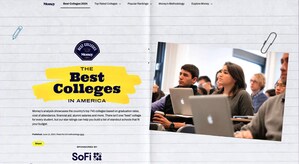DORADO, Puerto Rico, Aug. 25, 2020 /PRNewswire/ -- As students across the country acclimate to a COVID-19 era approach to the fall semester, Money announces its seventh annual ranking of the "Best Colleges in America for Your Money," putting more weight this year on affordability factors including the net price of a degree and new data to capture costs for students at different income levels. The Money team also looked at factors such as graduation rates, tuition fees, student debt, and career earnings. The resulting list consists of 700-plus colleges where students are likely to graduate with affordable debt levels and go on to earn a livable wage. According to Money, the top spot on its "Best Colleges in America" list for 2020 goes to the Massachusetts Institute of Technology, followed by Stanford and Princeton Universities in second and third place, respectively.
Money's Top 10 "Best Colleges in America for Your Money" are as follows:
- Massachusetts Institute of Technology
- Stanford University
- Princeton University
- University of Michigan-Ann Arbor
- Duke University
- University of Virginia
- Yale University
- Vanderbilt University
- University of California, San Diego
- University of California, Davis
For Money's complete list of the "Best Colleges in America for Your Money," go here. Money ranked colleges using this methodology.
"Choosing whether and where to go to college is one of the biggest financial decisions we make — and even more so this fall because of the pandemic. Our rankings can help parents and college-bound students make educated decisions about their future, even in these unpredictable times," said Kaitlin Mulhere, lead editor of Best Colleges and Education Editor at Money.
The pandemic and downturn of the economy has forced families to question whether college is "worth it," as students face a reduced college experience of remote courses and the absence of student life — while paying the same price for their education. In a new feature story, Money reporters explain why economic recessions stress the importance of a college degree and how their approach to the "Best Colleges in America for Your Money" holds value now more than ever. The Money team also shares a series of timely stories geared to helping readers choose the best college to fit their interests and needs during these unprecedented times.
Highlights include:
- How the Pandemic Will Change the Way You Apply to College This Year: Hundreds of colleges have implemented standardized-test-optional policies. Which colleges are going SAT/ACT optional? Are more people applying to schools closer to home? Is it easier to get into a competitive college via the waitlist? What will happen to merit aid? How should students address the coronavirus crisis in their college applications, and how can we expect admissions officers to respond?
- Black Lives Matteron Campus: How to Pick a College That Values Diversity: In light of this summer's focus on racial inequity, the Money team reports on how to find a college that shares values on anti-racism, including what statistics to look for, how to assess the curriculum and inclusion programs, and what questions to ask faculty and administrators when touring campus. The story includes interviews from incoming freshmen on how they navigated the college decision-making process and found a school that supports diversity initiatives and people of color.
Additionally, Money editors share insight on graduation rates and student debt broken down by race.
- How Colleges Are Handling Financial Aid When More Students Are Needing It Due to the Recession: While many households are experiencing financial instability, widespread job loss, and a decrease in income created by the coronavirus lockdown, families are trying to navigate how to get more money to pay for college bills and what they can do to appeal for more financial aid. Are colleges increasing their need-based aid? How have student loan rates been impacted by the pandemic and the CARES Act? How has fundraising changed as a result of the recession? How many appeals for more aid have colleges received this year? How does that compare to previous years?
The Money team offers the most current information and guidance for families on student loan rates and more.
- Why Isn't Tuition Lower If My Classes Are All Online: Students across the country are complaining about having to pay the same price for virtual courses as they do for normal, face-to-face instruction. Money reporters explain why it's not easy – or in some cases, possible – for colleges to simply cut the cost of education, even when courses are online.
- Experts Worry Coronavirus Will Cause More Colleges to Close. Here's How to Assess a College's Financial Health Before You Enroll: Money reporters provide insight on the trend of small, tuition-dependent private colleges closing and why coronavirus might speed that up. They also share more on how colleges are suffering financially and which ones will survive.
ABOUT MONEY:
Money has a nearly 50-year legacy of guiding people to financial victories with up-to-date information, education, and tools. Money, a digital destination, helps create richer lives for everyone—in every sense of the word. Signature franchises include a bevy of Best-In categories such as Best Mortgage Lenders, Best Life Insurance, Best Auto Insurance, Best VA Loans, Best Homeowner Insurance, Best High-Yield Savings Accounts, Best Credit Cards, Best Colleges, Best Student Loans, Best Student Loan Refinance Companies, Best in Travel, and Best Places to Live, with an aim to improve your finances and promote your well-being. For more information, visit Money.com.
SOURCE Money

Related Links
WANT YOUR COMPANY'S NEWS FEATURED ON PRNEWSWIRE.COM?
Newsrooms &
Influencers
Digital Media
Outlets
Journalists
Opted In





Share this article